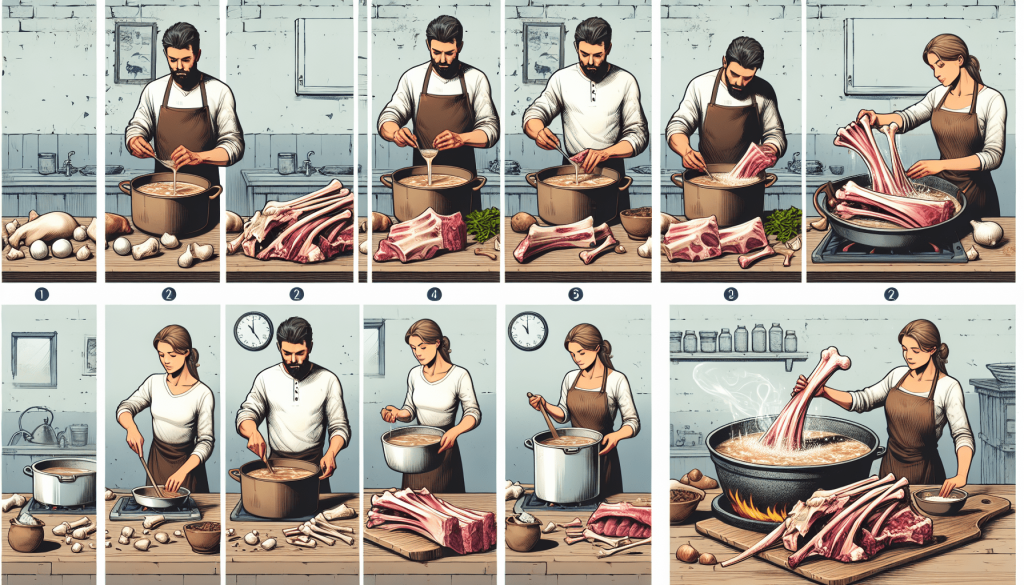Looking to incorporate bone broth into your carnivore diet? Look no further! In this ultimate guide, we will show you step by step how to make delicious, nutrient-packed bone broth that aligns perfectly with your meat-focused lifestyle. Whether you’re a beginner or a seasoned carnivore, we’ve got you covered. Get ready to discover the secrets to creating a hearty, flavourful broth that will nourish your body from the inside out.

Overview of the Carnivore Diet
What is the Carnivore Diet?
The Carnivore Diet is a type of diet that focuses primarily on animal products, particularly meat. It involves excluding carbohydrates, fruits, and vegetables from your meals and instead consuming only animal-based foods.
Benefits of the Carnivore Diet
Advocates of the Carnivore Diet claim that it can lead to various benefits. These benefits may include weight loss, improved digestion, increased energy levels, and reduced inflammation. Additionally, some individuals have reported experiencing mental clarity and improved athletic performance while following this diet.
Importance of Bone Broth in the Carnivore Diet
Bone broth plays a crucial role in the Carnivore Diet, as it provides essential nutrients that might be lacking from an exclusively meat-based diet. The high collagen and amino acid content of bone broth can support joint health, gut health, and skin health. Moreover, bone broth is a rich source of minerals like calcium, magnesium, and phosphorus, which are important for maintaining overall well-being.
Understanding Bone Broth
What is Bone Broth?
Bone broth is a nutrient-dense liquid that is made by simmering bones, along with any connective tissue and meat scraps, in water for an extended period of time. This slow cooking process allows the bones to release valuable minerals, collagen, gelatin, and amino acids into the broth.
Nutritional Benefits of Bone Broth
Bone broth is packed with numerous nutritional benefits. It is a great source of collagen, a protein that supports healthy skin, hair, nails, and joints. The gelatin present in bone broth can aid in digestion by promoting the growth of beneficial gut bacteria and healing the gut lining. Additionally, bone broth contains amino acids such as glycine and proline, which contribute to overall health and well-being.
Choosing the Right Bones
Types of Bones to Use
When making bone broth for the Carnivore Diet, it is important to select the right types of bones. You can use a variety of bones, including beef, chicken, pork, lamb, or fish bones. It is recommended to choose bones that are rich in collagen and connective tissue, as these will provide the most nutritional benefits.
Quality and Sourcing
To ensure the quality of your bone broth, it is crucial to source bones from reputable sources. Opt for organic, grass-fed, or pasture-raised animals, as these will provide higher-quality bones. Using bones from animals that have been raised in a natural and ethical environment will result in a more nutritious and flavorful bone broth.
Preparing the Bones
Roasting the Bones
One method of preparing the bones for bone broth is by roasting them in the oven. This step helps enhance the flavor of the broth by giving the bones a rich, caramelized taste. Simply spread the bones on a baking sheet and roast them at a high temperature for about 30 minutes until they are golden brown. This step is optional but can add depth to the final flavor of your bone broth.
Using Raw Bones
Alternatively, you can use raw bones directly in the broth without roasting them. This method is simpler and requires less preparation time. Raw bones will still release nutrients and minerals into the broth during the simmering process, resulting in a nourishing and flavorful final product.

Ingredients and Seasonings
Additional Ingredients for Flavour
While bone broth can be made with just bones and water, adding additional ingredients can enhance its taste and nutritional profile. Some common ingredients to include are onions, carrots, celery, garlic cloves, and herbs like thyme or parsley. These aromatic ingredients will infuse the broth with additional flavour notes.
Seasoning Options
Seasoning the bone broth is a matter of personal preference. You can add a pinch of salt or seasonings like black pepper, bay leaves, or turmeric to enhance the taste. Experimenting with different herbs and spices can help you customize the flavor to your liking.
Cooking Methods
Stove Top Method
The stove top method is the traditional way of cooking bone broth. Simply place the bones, additional ingredients, and water in a large stockpot. Bring the mixture to a boil and then reduce the heat to a gentle simmer. Allow the broth to cook for around 12 to 24 hours, skimming off any impurities that rise to the surface. This method requires occasional monitoring to ensure the broth is maintained at a simmer.
Slow Cooker Method
Using a slow cooker is a convenient and hands-off method for making bone broth. Place the bones, additional ingredients, and water in the slow cooker and set it to low heat. Allow the broth to cook for a minimum of 24 hours, but it can be left for up to 48 hours for maximum extraction of nutrients. The slow cooker method is ideal for those who prefer a more hands-off approach.
Instant Pot Method
The Instant Pot is a popular kitchen appliance that can also be used to make bone broth. This method offers the advantage of significantly reducing the cooking time while still achieving a flavorful broth. Simply add the bones, additional ingredients, and water to the Instant Pot, secure the lid, and select the pressure cook function. Cook the broth under high pressure for approximately 2 hours, followed by a natural release. This option is perfect for those who want to enjoy bone broth in a shorter timeframe.
Cooking Time
Duration for Optimal Extraction
For the best extraction of nutrients and flavors, it is recommended to simmer the bone broth for at least 12 hours. However, longer cooking times, such as 24 to 48 hours, can result in a more gelatinous and nutrient-dense broth. The longer the bones simmer, the more collagen, amino acids, and minerals they will release into the broth.
Shorter Cooking Time Options
If you’re short on time, you can still make a decent bone broth with a shorter cooking time. Using a pressure cooker like the Instant Pot can effectively extract nutrients in a fraction of the time. Alternatively, you can cook the broth for a minimum of 4-6 hours on the stove or use a slow cooker for a minimum of 12-24 hours. While the flavors and nutrient content may not be as concentrated as with longer cooking times, these options still provide a nutritious broth.
Straining and Storing
Straining the Broth
Once the bone broth has finished cooking, it should be strained to remove any solids and impurities. Carefully pour the broth through a fine mesh strainer or cheesecloth into a clean container. Discard the bones and vegetable remnants, as they have served their purpose in imparting their nutrients to the broth.
Proper Storage
To ensure the longevity and safety of your bone broth, it is important to store it properly. Allow the broth to cool to room temperature before transferring it to airtight containers. Refrigerate the broth for up to 4-5 days or freeze it for longer storage. When freezing, leave enough headspace in the containers to allow for expansion. Proper storage will maintain the quality and freshness of your bone broth.
Using Carnivore Diet Bone Broth
Drinking as a Nourishing Beverage
One of the simplest ways to enjoy bone broth on the Carnivore Diet is by drinking it warm, just like a comforting cup of tea or coffee. Sip on a mug of bone broth throughout the day to experience its nourishing and hydrating properties. It can provide a warm and satisfying alternative to traditional beverages while supporting your overall health.
Incorporating into Recipes
Bone broth can also be used as a flavorful base for soups, stews, and sauces. It adds depth of flavor and a nutrient boost to any recipe that calls for liquid. You can replace water or stock with bone broth in recipes like risotto, mashed potatoes, or braised meats to add richness and additional health benefits.
Conclusion
Importance of Bone Broth in the Carnivore Diet
Bone broth serves as a valuable addition to the Carnivore Diet, providing essential nutrients that may be lacking from an exclusively animal-based diet. Its abundance of collagen, gelatin, amino acids, and minerals supports various aspects of health, including joint function, gut health, and skin health. Incorporating bone broth into your Carnivore Diet can help ensure you receive a well-rounded and nourishing dietary intake.
Benefits of Making Your Own Bone Broth
Making your own bone broth ensures you have control over the quality of ingredients and the cooking process. By using high-quality bones and sourcing them ethically, you can create a broth that is not only nutritious but also free from any unwanted additives or preservatives. Additionally, homemade bone broth allows for customization, enabling you to experiment with different flavors and seasonings to suit your preferences. Overall, making your own bone broth empowers you to prioritize your health and well-being while enjoying a delicious and wholesome addition to the Carnivore Diet.
